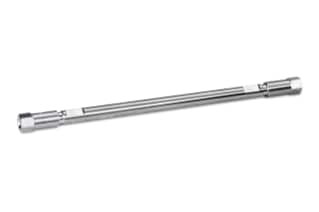
|
Chemistry |
C18 |
|
Separation Mode |
Reversed Phase |
|
Particle Substrate |
Silica |
|
pH Range Min |
3 pH |
|
pH Range Max |
7 pH |
|
Maximum Pressure |
6000 psi (415 Bar) |
|
Endcapped |
Yes |
|
Bonding Technology |
dC18 |
|
Silanol Activity |
Medium |
|
Particle Shape |
Spherical |
|
Particle Size |
5 µm |
|
Endfitting Type |
Waters |
|
Pore Size |
100 Å |
|
Format |
Column |
|
Surface Area |
330 |
|
System |
HPLC |
|
USP Classification |
L1 |
|
Inner Diameter |
3.9 mm |
|
Length |
150 mm |
|
Carbon Load |
12 % |
|
UNSPSC |
41115709 |
|
Brand |
Atlantis |
|
Product Type |
Columns |
|
Units per Package |
1 pk |

Atlantis dC18 Column, 100Å, 5 µm, 3.9 mm X 150 mm, 1/pk
The Atlantis dC18 analytical column is a universal C18 column that is compatible with both L.C. and M.S. In contrast to traditional reversed-phase HPLC columns, it has been engineered to achieve an excellent balance of retention for polar and nonpolar chemicals while demonstrating minimal retention of hydrophobic compounds. The Atlantis dC18 Column is compatible with aqueous mobile phases and has improved pH stability. The silica-based, di-functionally bonded C18 material of this equipment makes it an ideal piece of lab equipment for reversed-phase HPLC because of its carefully developed packing material that offers retention and separation of polar, water-soluble chemicals.
The Atlantis dC18 Column combines optimized stationary phase features such as end-capping, silica pore size, ligand type, and bonded phase ligand density to give superior peak form, low pH stability, improved polar compound retention, and hydrophobic collapse resistance (dewetting). The Atlantis dC18 Column, as one of the best reversed-phase HPLC columns, is appropriate for both polar compound separation and typical reversed-phase applications. The di-functional silane bonding chemistry used in the Atlantis dC18 column provides good stability under acidic mobile conditions, as well as a longer column lifetime and low pH stability.
You can increase your productivity with the ideal lab equipment. To learn more about the variations of the same product, such as the Atlantis dC18 Column, or to find additional products that work with it check out our shop for lab equipment; you can browse through our website, refer to our catalog and ensure your lab needs are met as needed.
We also recommend checking out the Atlantis Silica dC18 VanGuard Cartridge, 100Å, 5 µm, 3.9 mm X 5 mm, 3/pk; Atlantis dC18 VanGuard Cartridges are used to extend analytical column lifetime and performance by removing particulate contamination from the mobile phase stream. This cartridge is optimized to protect all 3.9 mm and 4.6 mm I.D. Atlantis dC18 analytical columns containing 5 µm sorbent particles.
What Is The Equilibration Method For The Atlantis dC18 Column?
Because the Atlantis dC18 Column is packed and sent with 100 percent acetonitrile, it is critical to check that the column and solvent are compatible before switching to a different solvent. You can utilize 10 column volumes of the mobile phase to equilibrate the Atlantis dC18 Column. Please handle the equipment with care and do not leave any droplets on the column's outside in order to ensure the lab equipment provides the best performance and has increased longevity.